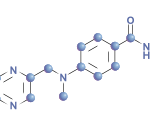 A recent phase 3, 24-month clinical trial evaluated the safety, efficacy and structural disease progression inhibition of tofacitinib, an oral JAK inhibitor, in adults with rheumatoid arthritis (RA). For the study, participants (N=797) had to have an inadequate response to methotrexate and were treated with tofacitinib in combination with methotrexate. The study results were published in the June 2019 issue of Arthritis & Rheumatology.1
A recent phase 3, 24-month clinical trial evaluated the safety, efficacy and structural disease progression inhibition of tofacitinib, an oral JAK inhibitor, in adults with rheumatoid arthritis (RA). For the study, participants (N=797) had to have an inadequate response to methotrexate and were treated with tofacitinib in combination with methotrexate. The study results were published in the June 2019 issue of Arthritis & Rheumatology.1
Patients were randomized into four groups, with a ratio of 4:4:1:1. They received 5 mg of tofacitinib twice daily (n=212); 10 mg of tofacitinib twice daily (n=220); placebo with nonresponders switched to 5 mg of tofacitinib twice daily (n=55) at Month 3; or placebo with all remaining patients switched to 10 mg of tofacitinib twice daily (n=52) at Month 6—all with a stable background dose of methotrexate.
Clinical efficacy, treatment-emergent adverse events and structural progression were evaluated using the ACR20, ACR50 and ACR70. The end points included the proportion of patients who achieved remission or low disease activity according to the four-variable Disease Activity Score in 28 joints using the erythrocyte sedimentation rate (DAS28-ESR), Clinical Disease Activity Index (CDAI) or Simplified Disease Activity Index (SDAI); Boolean remission; and Health Assessment Questionnaire disability index (HAQ-DI) scores.
Results
Of the study patients, 539 (67.6%) completed 24 months of treatment. All patients had similar responses with improvements and uninterrupted low disease activity or remission during the 12–24 month observation period. Radiographs of these tofacitinib-treated patients, including patients switched from placebo, had no new erosions.
Adverse events were similar in type and frequency for both tofacitinib doses. No new safety signals were identified. The most common adverse events were rhinitis, upper respiratory infection, headache, urinary tract infections, bronchitis and varicella zoster. This study showed maintenance of efficacy through Month 24 in methotrexate-nonresponders, when methotrexate was combined with tofacitinib and comparable safety with previously reported studies.
Michele B. Kaufman, PharmD, BCGP, is a freelance medical writer based in New York City and a pharmacist at New York Presbyterian Lower Manhattan Hospital.
Reference
- van der Heijde D, Strand V, Tanaka Y, et al. Tofacitinib in combination with methotrexate in patients with rheumatoid arthritis: Clinical efficacy, radiographic and safety outcomes from a 24-month, phase 3 study. Arthritis Rheumatol. 2019 Jun;71(6):878–891.

